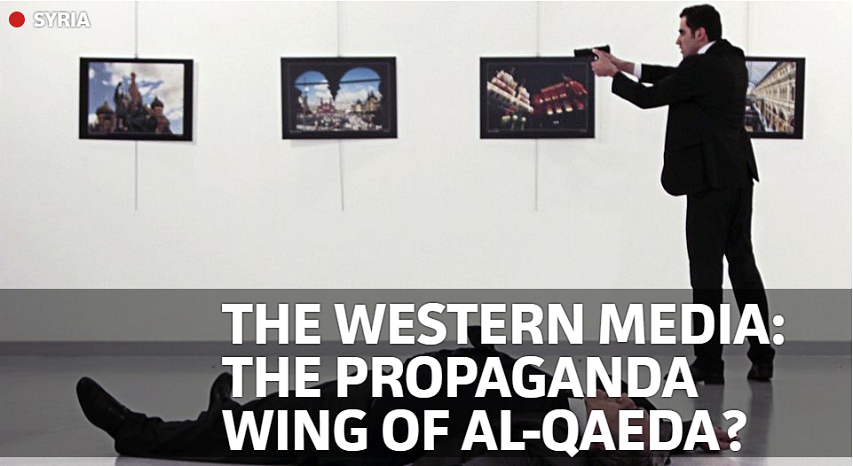Brendan O’Neill on the way western media have been trained to report certain events to benefit terrorist organizations:

The British press is morphing into a mouthpiece for al-Qaeda. Consider its coverage of yesterday’s assassination of Andrei Karlov, the Russian ambassador to Turkey. It is borderline sympathetic. The killer’s words — or rather, certain of the killer’s words — have been turned into emotional headlines, into condemnations of Russia’s actions in Syria. That the killer’s first and loudest cry was ‘Allahu Akbar’ — the holler of the modern terrorist — has been downplayed, and in the case of at least one newspaper, the Express, completely ignored. Instead the papers upfront the killer’s other cries, about Aleppo. ‘This is for Aleppo’, says The Times. ‘Remember Aleppo’, says the Mirror’s headline, but with no quote marks, because these were not the exact words spoken by the gunman — they’re more like the Mirror’s own sympathetic echo of the killer’s sentiment.
To get a sense of how disturbing, or at least unusual, this coverage is, imagine if the 2013 murder of British soldier Lee Rigby by two Islamists had led to headlines like ‘This is for Afghanistan’ or ‘Remember Basra’ (those two knifemen, like Karlov’s killer, justified their action as a response to militarism overseas). Or if the 7/7 bombings had not given rise to front pages saying ‘Terror bombs explode across London’ or ‘BASTARDS’ but rather ‘While you kill us in Iraq, we will kill you here’. Reading the early coverage of Karlov’s killing, and noting how different it is to British press coverage of other acts of Islamist terror, one gets the impression that the media think this killing is justified, or at least understandable. ‘Remember Aleppo’: they’re saying this as much as the killer is — a perverse union of terrorist and editorial intent.
But the killer said, first, ‘Allahu Akbar’. Which perhaps suggests that his sympathy was not with Syria as such but with certain forces in Syria. Forces likely to shout ‘Allahu Akbar’ as they kill people. Islamist forces. Something peculiar has happened in British media and political circles in recent weeks. Having spent years telling us al-Qaeda-style groups are the greatest threat to our way of life, these people have lately become spectacularly uncritical about, and even weirdly supportive of, the existence and influence of al-Qaeda-style groups in Syria. The press coverage of Karlov’s killing is in keeping with the superbly reductive, highly moralised media coverage of events in Aleppo over the past fortnight, in which there are apparently only two sides: defenceless civilians and evil Russia and Assad. The militants in Aleppo, which include some grotesquely illiberal and misanthropic groups, have been airbrushed out of the coverage as surely as some reporters airbrushed away, or at least demoted to paragraph six, the Turkish assassin’s cry of ‘Allahu Akbar’.



